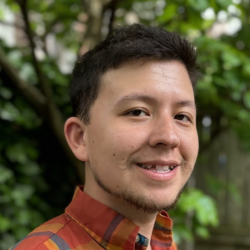Mark Sorrentino (Intern Therapist)
Mark Sorrentino (he/him) is an intern therapist at the Center for Growth. His internship runs from May 13, 2024 to May 7, 2025. He is currently working towards his master’s degree in clinical and counseling psychology at Chestnut Hill College. He is available for individual in-person therapy at the Art Museum/Fairmount PA office and Virtual in PA and NJ.
Mark is interested in therapeutic work that gradually encourages clients to engage with a more whole version of themselves. He views therapy as an ideal venue for discovering and embodying aspects of the self that may have previously been neglected, under-realized, or unsafe to emerge. It is his aim to stay open and curious about the complexities that frame each of his client’s lives, working together to discover what wants to be changed from within and from outside.
Mark hopes to bring warmth, openness, and concern to his work with clients. He finds value in utilizing a variety of therapeutic modalities for differing concerns. He prefers to root his therapeutic practice within psychodynamic ideas that emphasize the importance of attunement, relationship, and family structure, and to draw from behavioral and cognitive models when working with issues of particular anxiety and behavioral organization. Mark is a curious person who is eager to further develop his therapeutic style as it continues to take influence from the wisdom of new experiences, both professional and personal.
Mark has a special interest in the following:
Bereavement
Trauma and PTSD
Exploring Non-traditional Relationships (Polyamory)
Creativity
Individual Sexuality
Personality Disorders
Life Transitions
Queer and Trans Identity
Self Esteem
Anxiety
Attachment Issues
Background:
Mark completed a Bachelor of Science in Psychology at Drexel University. Here, he received a thorough introduction to the research aspect of psychology, completing coursework in neuroscience and evolutionary psychology. Additionally, he worked as a research assistant in several labs, conducting studies and assisting with data collection and analysis. These experiences helped him to understand more of what occurs in psychological research and to appreciate present clinical tools available from behavioral and neuroscientific research, as well as the importance of staying updated with current literature as an active clinician.
Within his graduate program at Chestnut Hill College, Mark has integrated his behavioral, research-focused undergraduate background with the extensive clinical insights of psychodynamic theory. He has focused a substantial amount of his coursework on trauma studies, as well as bereavement and geropsychology. This coursework has helped him to better understand the pervasive influence of traumatic experiences on nearly every aspect of a person's life and to find great hope in the power of individuals to overcome these struggles through evidence-based, therapeutic approaches.
Mark is a person who has found himself drawn to many pursuits. He takes great interest in his creative life, and has enjoyed developing a knack for writing, printmaking, and collage. He enjoys arranging visual imagery and words that help to express something of a complex feeling or experience. Additionally, Mark enjoys spending time in nature and cooking with loved ones.
Bereavement:
Experiences of major loss tend to disrupt a person to their core, putting a pause on many significant and gratifying areas of life, while one’s motivations and ways of being in the world are temporarily shaken and perhaps even questioned. Encounters with death and loss are unfortunately inevitable. The way that each person experiences grief is unique and often unexpected. Feelings that arise in grieving a loved one can be complex and confusing.
While there is nothing pathological about experiencing grief, even in its intensity, working with a trusted therapist who is familiar with bereavement challenges (and open and accepting of their intensity and longevity) can make a large difference in supporting a grief experience that is ultimately well-processed, integrated, and understood.
Mark hopes to bring a warm, honest, and accepting presence to clients facing bereavement. He understands that many aspects of our culture discourage (and to some extent disenfranchise) full experiences of grief. Individuals are tasked with jumping back into their everyday lives and responsibilities fairly quickly, and many are uncomfortable with talking about death or witnessing its impact. Consequently, bereavement can be an uncomfortable and isolating time in which one may feel misunderstood by people in their lives who mean well, or perhaps ashamed and confused that they are not able to adapt faster.
Ultimately, Mark hopes to encourage his clients to experience their grief in a way that is personally meaningful to them. He is aware of many useful tools of grieving that can facilitate accessing this fullness of an integrated experience. Emotional processing, engagement with personal rituals, and narrative meaning-making are all instrumental in integrating and bearing witness to the difficulties of grief.
Creativity:
Mark understands that many people feel a desire to be more creative and experience the gifts associated with freely creating and expressing oneself through artistic means. But many experience setbacks and obstacles rooted in doubt, hesitation, and shame for their current abilities or output. Mark views therapy as a meaningful space for exploring obstacles to creativity, examining current judgements and motivations that may be limiting. Mark hopes to work with clients in a way that encourages them to question the attitudes that have prevented them from attempting creative pursuits and to take small chances on exercising their unique, playful, creative potential.
Mark views creative practice as a means of both self-expression and self-understanding that just about everyone can benefit from in some way. Even for those who do not wish to refer to themselves as artists, creative rituals offer great therapeutic potential. Visual and auditory artistic expression can help one to make sense of complex feelings and experiences that mere logic cannot articulate.
Individual Sexuality:
Mark views the sexuality of every person as a great gift that they deserve to feel an embodied, empowered connection to. Unfortunately, many factors and experiences can lead one to lose touch with their sexuality or to feel that they haven’t yet arrived at a place of pleasurable connection during sex that they would have expected or liked to. Issues of sexual functioning can cause embarrassment and feelings of alienation. These experiences can inhibit one from feeling as connected as they would like to be with themselves and with others.
Fortunately, through individual sex therapy, many avenues exist for one to gradually attain new pleasures and connection to the self that may have once seemed an unlikely possibility. Through talk therapy and take-home exercises, Mark hopes to encourage clients to bring clarity, gradual change, and renewed presence to their sexual selves.
Trauma and PTSD:
Mark is particularly interested in working with individuals who have experienced trauma, whether considered small or large. He is most interested in utilizing evidence-based, attunement-centered approaches which provide clients with much needed emotional and embodied attunement and a gentle venue to process disruptive, bodily-contained, traumatic memories. Mark believes successful therapy for trauma occurs when clients are gradually able to find safety and attunement in themselves and the therapeutic environment. From here, clients can begin to slowly process traumatic memories in a way that is not purely intellectual but emotional and embodied as well.
When a person experiences a traumatic event (or many traumatic events), it changes the way that they naturally use their brain. This is not a permanent, irreversible change, but it is very difficult to fix on one’s own without therapy that is specifically designed to work on trauma.
One major way that it changes the way we use our brains is to orient us to using a ‘survival brain’ instead of a ‘learning brain.’ The learning brain allows us to engage with the world and ourselves in a way that encourages us to build meaningful knowledge and pursue goals. It allows us to be curious about ourselves, others, and the world by engaging all systems in the brain appropriately, most particularly the pre-frontal areas of the cortex which are responsible for executing and considering complex action. The learning brain is important not only for learning facts and succeeding in an academic way but also for learning and engaging in relationships and figuring out who you are in the world.
But when danger is present (as in the case of trauma), the learning brain is sacrificed so that we can engage instead with our survival brain. The survival brain makes use of much older, instinctual parts of the brain, like the amygdala and brain stem. It is hypervigilant of its surroundings in a way that is intended to protect you but actually lowers your ability to protect yourself and take care of yourself over time. A person can recover from long standing use of their survival brain by creating an environment that is physically and emotionally safe, which will coax the learning brain to assume its rightful position again.
Mark believes that trauma-focused and informed therapy is a powerful tool for changing the way we use our brains for the better, in nearly every aspect of our lives that matters to us.
Queer and Trans Identity:
Mark understands that living as a queer or trans person poses many opportunities for connected joy but also for disconnected hardship. The task of integrating a newfound identity (or perhaps a long acknowledged one) with various areas of life, such as family, career, friendships, and romantic relationships, can be challenging and confusing. As a queer and trans man, Mark relates to many of these experiences and looks forward to working with clients who hope to find clarity, understanding, and direction in navigating their identities in the world.
Mark views every person’s experience of these identities as unique to their own. He sees therapy as a space well-suited to exploring one’s experiences in detail and discovering how one wishes to make sense of their identity, through self-expression, initiation of conversations with important others, and perhaps self-advocacy.
Mark Sorrentino (Intern Therapist)'s Resume
Licensure:
- Pennsylvania: Graduate student, working under supervision.
- New Jersey: Graduate student, working under supervision














